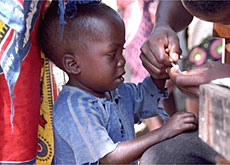Spreading the net

In April 2000, African heads of state met in Abuja, Nigeria, and endorsed a far-reaching plan to roll back malaria in Africa.
One of three key targets they set was that by the year 2005 at least 60 per cent of pregnant women and children would sleep under an insecticide-treated bed net.
One country which is well on its way to reaching that goal is Tanzania. A month before the Abuja meeting, a task force had been formed with the aim of making insecticide-treated nets (ITNs) available nationwide.
Its inspiration was a Swiss-Tanzanian study called Kinet; its tool was social marketing.
Within two years, all the stakeholders in the country had united to promote the new initiative from the ministry of health to donors, non-governmental organisations, the research community and net and insecticide manufacturers.
Smitn not bitten
Well before Kinet had run its course, it encouraged another larger project funded by the British and Dutch governments – the Social Marketing for Insecticide Treated Nets (Smitn) programme.
Like its predecessor, Smitn demonstrated that you can use commercial marketing techniques to create demand for mosquito nets and insecticide treatment, particularly in rural areas.
The components of a national strategy to promote greater use of ITNs were coming together. When Smitn evolved and expanded into Smartnet, the stage was set.
One important step came when Tanzania decided to remove all taxes and tariffs on mosquito nets so that they could be sold as cheaply as possible.
Then, last October, the country’s three net manufacturers agreed to package all their nets with a sachet of insecticide. They have since sold more than half a million of these bundled nets.
In return they have received help with advertising, distribution and promotion.
“We are trying to create a system so that everybody living in malaria-prone regions can afford to buy a net,” says task force member, Christian Lengeler, of the Swiss Tropical Institute in Basel.
Global resources
Pregnant women and their newborn children are the groups most in need of protection.
Last December, the scheme received a major boost in the shape of $12 million from the Global Fund to fight Aids, Tuberculosis and Malaria.
The money will go towards a voucher scheme that enables women attending antenatal clinics to receive a voucher worth two-thirds of the price of an ITN.
Expectant mothers will also be able to use the vouchers to acquire insecticide retreatment kits.
In Tanzania, 90 per cent of pregnant women attend antenatal clinics at least once before giving birth.
Meanwhile, Switzerland has set up a unit within the Tanzanian ministry of health, to coordinate the national strategy.
This draws upon the expertise of the Swiss Tropical Institute and is funded by the Swiss Development Agency.
Main challenges
Net ownership in Tanzania averages 37 per cent but that figure masks a huge gap between the towns (71 per cent) and rural areas where most of the population lives.
“The main challenge is to get the rural population covered,” says Jane Miller of Population Services International Tanzania, the social marketing organisation, contracted by the government to promote the use of ITNs.
“At the moment only 28 per cent of households in rural areas have a mosquito net and that doesn’t even mean that all the people in the household are covered.”
Another huge challenge is persuading people to retreat their nets or indeed to even soak them in insecticide in the first place.
Health experts say an impregnated net is twice as effective in preventing malaria as an untreated product, but as yet only a tiny fraction of nets (10-16 per cent) have ever been treated.
“The community perception for nets is tangible,” says Mohammadou Kabir Cham of the World Health Organization’s Roll Back Malaria campaign in Geneva.
“You feel it, you see it, you know the quality but the insecticide part is invisible, not tangible, so it is difficult to promote.”
A solution, which would make the entire process redundant, are long-lasting treated nets which retain their insecticidal properties for several years. Such products are starting to appear on the market.
Net profit
Recent studies have shown that ITNs benefit not just the individuals who sleep under them but also people in the vicinity.
Simply by reducing the number of infected mosquitoes in the environment that are able to transmit malaria, treated nets offer protection up to a range of several hundred metres.
The findings suggest that effective protection of a whole village might be achievable without everybody owning a net.
“If we have between 60 and 70 per cent of nets within a community which are treated, we can be pretty confident that we will have much broader protection within the community as a whole,” says Alasdair Unwin of the national malaria control programme.
Above all, it offers the possibility of bringing help to the poorest of the poor who fall through the net of virtually every public health intervention.
“If you could protect every child in Tanzania with a treated mosquito net, you could be looking at saving about 30,000 lives a year,” says Lengeler.
“If you applied that to the whole of Africa, you would prevent roughly half a million deaths every year.”
swissinfo, Vincent Landon
Treated mosquito nets cut child deaths by about 20-30 per cent.
They reduce malaria cases by 50 per cent.
Tanzania’s national programme to extend net coverage has united all stakeholders.
These include the Tanzanian, British, Dutch and Swiss governments.
WHO, Unicef, net and insecticide manufacturers are also on board.
ITN use across Tanzania could save 30,000 lives a year.

In compliance with the JTI standards
More: SWI swissinfo.ch certified by the Journalism Trust Initiative










You can find an overview of ongoing debates with our journalists here . Please join us!
If you want to start a conversation about a topic raised in this article or want to report factual errors, email us at english@swissinfo.ch.